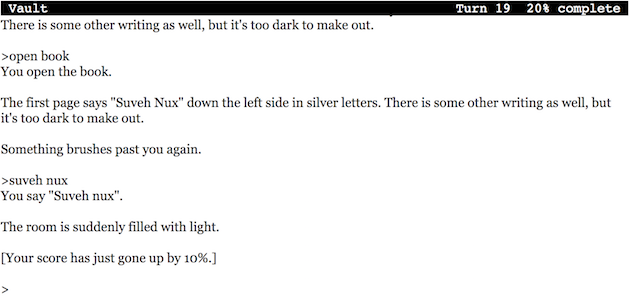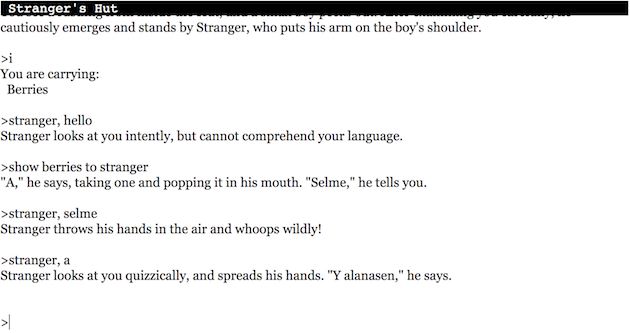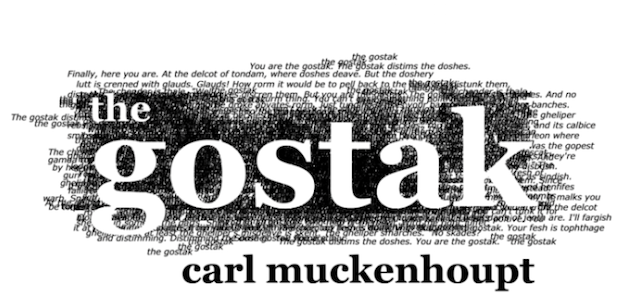Interactive fiction, especially parser interactive fiction, has a tradition of wordplay games: pieces where you manipulate spellings, untangle anagrams, and solve puzzles using common proverbs and idioms.
Infocom's Nord and Bert Couldn't Make Head or Tail of It went to town with these concepts, with different game sections devoted to different types of pun and spoonerism. In Simon Christiansen's PataNoir, you resolve all the puzzles by interacting with items that appear in the game's copious metaphorical vocabulary. Ad Verbum (Nick Montfort) uses spelling as a source of constraints, as in the room where you can only use words beginning with a particular letter. Roger Firth's Letters from Home is an interactive crossword where the player wanders an old house looking for items that sound like letters of the alphabet (tea -> T, of course) in order to deploy them in a letter puzzle. The prolific Andrew Schultz has made wordplay and encryption games the main subject of his work.
But there's another category of games-about-words that don't quite qualify as wordplay in the same sense, but that make heavy use of IF's textual nature all the same. These are games where you're actually working out a language, or at least an encryption, as you play; learning and then deploying a new vocabulary and possibly a new syntax as well.
Suveh Nux (David Fisher, Inform) is a room escape scenario that is, on the face of it, fairly mundane: you're stuck in a locked vault with a spellbook, and you need to make your way out.
But spells in this world are cast with entire sentences, with an extensive vocabulary for referring to items, extending or limiting your spell effect, or reversing the consequence of your spell. You can't target something with your spell until you know what that item is called in the game's magical language. And you don't initially know what the vocabulary is or how the spell syntax works — so you need to reverse engineer the entire magic system from the information gleaned from a few particular example spells and some devices you discover as you play.

Making something like this work requires a rigorous implementation so that all the player's thrashing about produces some kind of rewarding new information. It needs a careful set of clues, just enough to keep things moving but not so much that the player feels like their hand is being held. Suveh Nux healthily lives up to all of those requirements, and adds some easter eggs.
If the idea of learning a magical language appeals, Words of Power (Stark Springs, Inform) also makes use of a magical grammar, though it doesn't rely quite so heavily on the player's memory. Instead, the glyphs you've learned for recombination are presented as buttons at the bottom of the screen.
Infidel (Michael Berlyn, Infocom) features a series of hieroglyphics throughout the game that the player has to learn to decipher, through note-taking and collecting additional examples. The first few symbols are provided by the game's feelies, to get the player started.

But from there, it's largely a matter of working out meanings from context. Infidel doesn't try terribly hard to make these hieroglyphics seem realistic — they're all rendered in ASCII, after all, and mostly they're providing information about how to dodge the traps in the treasure-filled pyramid you're exploring. And — as game historian Jimmy Maher points out — they correspond exactly to English words and syntax, in a way that a real ancient language never would.
The Edifice (Lucian Smith, Inform) is not exclusively composed of language puzzles, but it's the language puzzle for which the game is primarily remembered. The Edifice presents the player with a series of challenges associated with different moments in the evolution of humanity. At one point, your puzzle involves a meeting with a Stranger who doesn't speak your language, but you need to learn enough about how he communicates to be able to ask him for feverleaf for a sick child.

In this case, the character of the stranger is actively trying to help you learn his language, which makes this both puzzle and a (neatly constrained) NPC interaction: it's reasonable that you can't simply ask the NPC any old question you might have, because your shared vocabulary is so small.
The other element that makes this scene a standout is its placement in the story. It follows several other puzzles in which the player is learning to do things like make a spear and hunt animals, interactions presented in deliberately rudimentary language. When we reach a point where it's possible to speak to another character, that change feels like a reward as well as a puzzle in its own right.
The Gostak (Carl Muckenhoupt, Inform) takes this a step further: the entire game is written in a language that syntactically resembles English, but does not share much of the vocabulary. Even the help text and standard parser replies are rewritten into Gostakian — a point that provides a little help if you're an experienced parser aficionado who has memorized all of those replies. But manipulating this alternate world with its alternate collection of verbs and nouns can be extremely mind-twisting, and those of us who rely heavily on visual imagination may struggle to picture any scene at all.

I confess, I've never actually finished the Gostak. I've played many times, wading in and splashing around at the shallow end. I find it induces a very strange mental experience, where it feels as though you're holding dozens of pieces in place simultaneously in order to suggest some kind of sense. Relax for a moment, and they revert to being incomprehensible. This is fun! For some people, anyway.
Honorable Mention: Lighan ses Lion (Andrew Plotkin, non-interactive transcript) is an entry in a competition I ran years ago, where I supplied a list of commands and challenged participants to come up with either a working game or a transcript describing a game that matched that command list. The competition drew a wide variety of entries — some working and some otherwise — but Andrew approached the challenge in a particularly perverse way, by inventing an alternate language in which all the walkthrough commands would have some completely different meaning than they seemed to have in English. Lighan ses Lion is the transcript of that alternate language game. At the time, I convinced myself I had some idea what some of it meant — but I never fully mastered it, any more than I ever completely decrypted The Gostak.
[Disclosures: Lucian Smith has stayed at Emily's house. She has also met Nick Montfort, Roger Firth, Andrew Plotkin, and Carl Muckenhoupt. More generally, Emily Short is not a journalist by trade and works professionally with various interactive fiction publishers. You can find out more about her commercial affiliations at her website.]
from Hacker News https://ift.tt/3gWWS6R
No comments:
Post a Comment
Note: Only a member of this blog may post a comment.